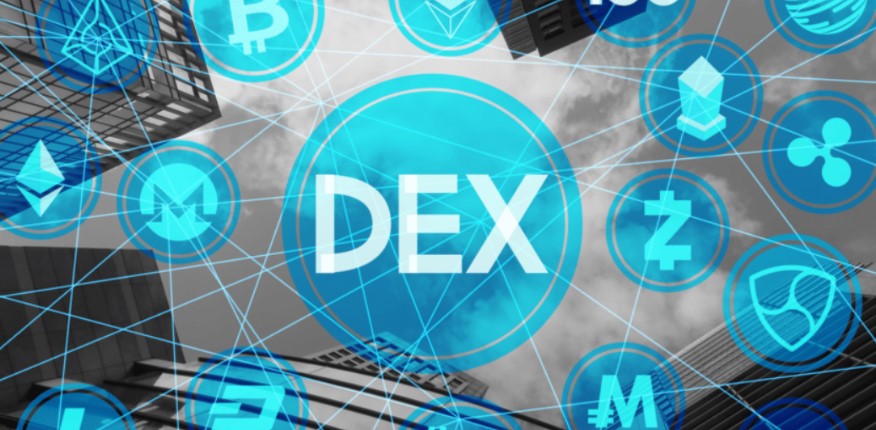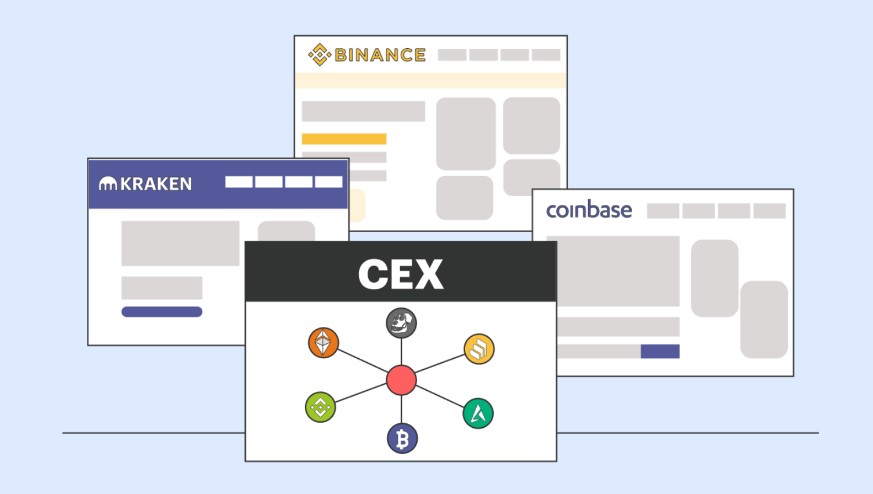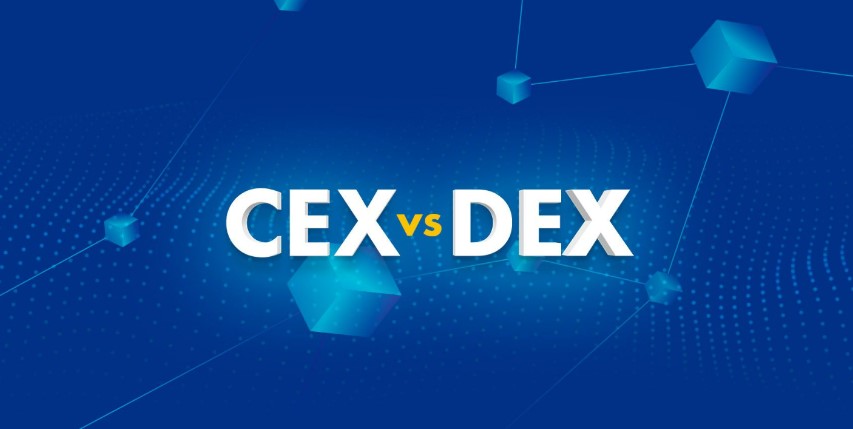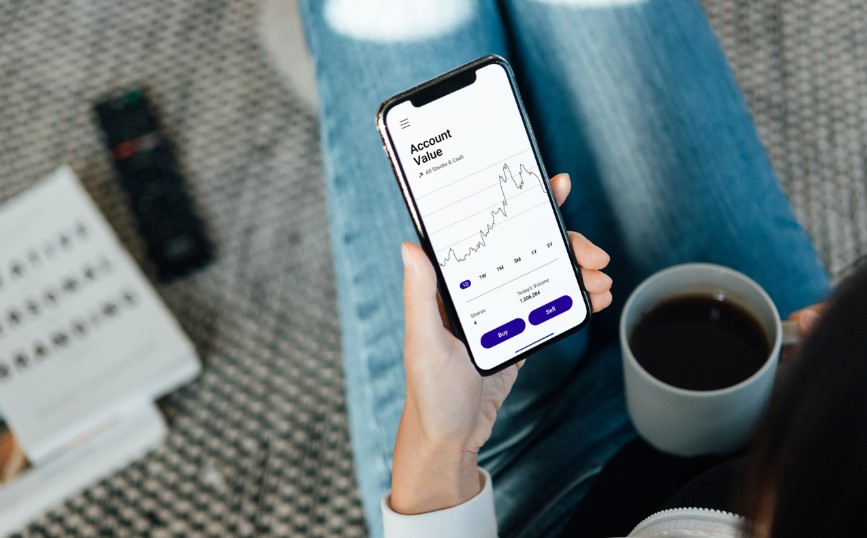Cryptocurrency trading has become increasingly popular in recent years, with more and more people looking for ways to participate in the market. And currently, there are two main types of cryptocurrency exchanges – decentralized (DEX) and centralized (CEX). Each type has its advantages and disadvantages, so it’s essential to understand the differences between them before deciding which is best for your needs.
Table of Contents,
How Do DEXs Work? 🌐

What is DEX?
Decentralized exchanges, or DEXs, are cryptocurrency trading platforms that operate without a central authority. Instead, DEXs use smart contracts and blockchain technology to enable direct trades, giving them complete control over their funds and eliminating the need for a middleman.
Unlike centralized exchanges, such as Coinbase and Binance, which require registering and using their services to trade cryptocurrencies, DEXs allow people to conduct peer-to-peer trades directly from their wallets. This means that users can remain anonymous while trading on these exchanges, making them particularly attractive to those who value privacy and security.
Furthermore, because there is no single point of failure with decentralized exchanges (DEXs), they are more resilient against hacking than centralized ones. In addition to offering privacy and security benefits, DEXs also typically offer lower fees than most CEXs due to eliminating intermediaries in the transaction process.
Benefits
DEXs are attractive for several reasons.
- The most important being their decentralized nature. Since no central authority regulates trades on these platforms, traders can remain anonymous and have complete control over their funds.
- Another significant advantage of DEXs is their ability to facilitate censorship-resistant trading. Because no central authority can control what can be traded or who can participate, DEXs provide a level of financial freedom and privacy that is not possible with traditional exchanges. This is particularly important for traders living in countries with strict financial regulations or wanting to maintain anonymity while trading.
- The key benefit of using a DEX is increased security since users retain control over their private keys and funds.
Challenges
Despite the numerous advantages of using a DEX, you should also consider some downsides.
- One of the biggest challenges posed by DEXs is their lack of liquidity. Since these types of exchanges are typically less popular and have fewer traders than CEXs, it can often take time to find trading partners for certain assets. In addition, unlike centralized exchanges, which often have large amounts of liquidity due to market makers and other participants, DEXs can struggle to attract enough liquidity to support a robust trading environment. This can lead to price slippage and order book depth issues, making it harder for traders to execute large orders.
- Another potential issue is the lack of customer support and services. Due to their decentralized nature, most DEXs do not offer customer support or services such as order matching, margin trading, stop-loss orders, etc., which can be found on many CEXs.
- The next challenge is the complexity of the user experience. While DEXs are designed to be more secure and decentralized than traditional exchanges, they can also be more difficult to use. This can be particularly challenging for users who are new to cryptocurrency or unfamiliar with blockchain technology’s technical aspects.
- Finally, the lack of regulatory oversight and protection makes DEXs more vulnerable to scams, fraud, and other malicious activities.
How Do CEXs Work? 🏦

What is CEX?
Centralized exchanges are online platforms that allow traders to buy, sell, and trade cryptocurrencies such as Bitcoin, Ethereum, Litecoin, and others. CEX refers to a type of cryptocurrency exchange where transactions are facilitated and controlled by a central authority. In other words, CEXs act as intermediaries between buyers and sellers by providing a secure transaction environment. In addition, they typically offer services such as order matching, margin trading, stop-loss orders, etc., which make them attractive to more experienced traders.
Benefits
CEXs offer many advantages.
- Perhaps the most significant benefit is the ease of use and accessibility. CEXs are typically more user-friendly and have less technical complexity than DEXs, which makes them more accessible to novice traders.
- Another significant advantage of CEXs is their liquidity. CEXs typically have a much larger user base than DEXs and are better able to attract enough liquidity to support a robust trading environment. This makes it easier for users to execute large orders without experiencing significant price slippage or order book depth.
- CEXs offer a higher level of customer support than DEXs since a central authority manages them. This means traders can get help from the exchange if they need it or if anything goes wrong.
- Another advantage of CEX is the security they provide. Centralized exchanges usually have advanced security measures in place to protect users’ funds from hackers and fraudsters. For example, they typically use advanced security features such as two-factor authentication (2FA), encryption, and multi-signature wallets to keep users’ funds safe.
- The range of services offered by CEXs is also a strong side. For example, they can provide educational services, trading bots, and other features due to the expansive centralized infrastructure.
Challenges
What are the major downsides of centralized exchanges?
- One of the biggest challenges of CEX is the lack of privacy. Since all transactions are facilitated through a central authority, users’ personal information and transaction history are often recorded and stored on the platform. This lack of privacy can be a significant concern for users who value their anonymity and confidentiality.
- Another challenge of CEX is the risk of centralization. Since a central authority controls all transactions, the platform can be susceptible to regulatory crackdowns and censorship. In addition, since these types of exchanges are subject to the regulations of their respective countries, users may not be protected from certain risks, such as fraud or market manipulation. This can be particularly concerning for users trading high-risk assets or engaging in complex trading strategies.
- CEXs have a high level of liquidity, as we mentioned before. Still, these platforms may suffer from liquidity problems during high market volatility, causing significant price discrepancies and trading delays.
- Many centralized exchanges have restrictions on the types of cryptocurrencies they support, which can limit users’ options for trading.
- The high trading fees associated with CEXs can also challenge some users, especially those who regularly trade large amounts of cryptocurrency. Since these fees can add up quickly, users may find their profits significantly reduced due to the high cost of trading on CEXs.
- CEXs may not always provide transparency about their operations or how they use users’ data. This can make it difficult for users to confirm that their funds are secure on the exchange.
- In addition, a potential challenge is the lack of decentralization. Centralized exchanges are not immune to hacker attacks and other malicious activities. While CEXs typically employ advanced security measures, they can still be vulnerable to cyber attacks if proper safety procedures are not followed.
Comparing CEXs and DEXs

Regulation Differences
Understanding the regulation differences between centralized exchange VS decentralized exchange is crucial for anyone who wants to trade cryptocurrencies and comply with applicable laws and regulations.
Since CEXs are regulated by their respective countries, there may be differences in the regulations imposed on them depending on their location. In addition, the law varies widely depending on the region platforms are operating in. This can make it difficult for users to know what exact rules and regulations apply to their exchange. While some countries may have stricter regulations for CEXs, others may not regulate these types of exchanges.
Different types of cryptocurrencies will be subject to varying levels of regulation depending on their classification, either as a security or commodity. In general, CEXs tend to face more regulatory scrutiny than DEXs due to their centralized nature and the fact that they often handle user funds directly. This means that CEX operators must comply with local financial laws and regulations such as anti-money laundering (AML), know your customer (KYC) requirements, capital reserve requirements, and other compliance measures set by national governments or international organizations like FATF. For example, AML regulations require CEXs to monitor and report suspicious activity, such as money laundering and terrorist financing, to government authorities.
CEXs must comply with other financial regulations, such as capital requirements and insurance. These regulations are in place to protect users’ funds and prevent fraud, theft, and other malicious activities.
On the other hand, DEXs operate on a peer-to-peer network and do not have a centralized authority. As a result, DEXs have a different level of regulatory oversight than CEXs. In fact, many DEXs are designed to operate outside government regulation and provide users with a high degree of anonymity and privacy. For example, DEXs typically do not require users to provide personal information or store user funds directly, so they can often operate with less regulatory oversight than CEXs.
Since there is no central authority to oversee the exchange, users must rely on the blockchain technology and smart contracts that power the DEX to ensure the security and accuracy of transactions.
In recent years, some governments have taken steps to regulate DEXs, requiring them to comply with KYC and AML laws. However, this has been met with resistance from many in the cryptocurrency community who believe that government regulation undermines the core principles of decentralization and privacy.
Verification Problems
Verification problems can be a major hurdle for traders on both centralized and decentralized exchanges.
CEXs typically require users to go through a rigorous verification process before trading cryptocurrencies. In addition, to comply with KYC and AML laws, CEXs require users to provide personal information such as name, address, and ID. This can make it difficult for users who do not have access to a government-issued ID or are unwilling to provide this information.
One of the most common verification problems CEX users face is delays in the verification process. This delay can be caused by various factors, such as an influx of new users, technical issues, or human error. Delays can be frustrating for users who want to start trading immediately and may cause them to seek alternative exchanges offering faster verification times.
Furthermore, some CEXs may take several days to verify users, and there may also be limits on how much money or cryptocurrency users can deposit or withdraw in a single transaction. This can lead to delays in processing transactions and frustrate users who are looking to trade quickly and efficiently. Some CEXs even may require users to pay a fee for verification which can be costly.
On DEXs, verification typically requires users to prove ownership of an account or wallet to access trading features.
DEXs, on the other hand, typically do not require users to go through a verification process, making them more attractive to users who value privacy and anonymity. However, the lack of verification can also make it more difficult for DEXs to prevent bots and other automated trading programs from manipulating the market. This can result in price discrepancies and other market irregularities that harm real users.
Security Matters
CEXs typically store user funds in a central database or hot wallet, which makes them more vulnerable to hacking and other security breaches. Many CEXs employ a range of security measures to mitigate these risks, such as 2FA, SSL encryption, and anti-phishing tools.
However, CEXs have still been subject to several high-profile security breaches in the last few years, resulting in the loss of millions of dollars worth of cryptocurrencies. These incidents highlight the importance of choosing a reputable exchange with a proven security track record.
DEXs, on the other hand, operate on a decentralized network, which means that user funds are not stored in a central database or hot wallet. Instead, users retain control over their funds through a personal wallet, which can increase security by reducing the risk of hacking and other security breaches.
But this decentralization can also create other security concerns. For example, DEXs rely on smart contracts to execute trades, which can be vulnerable to bugs.
Popularity DEX VS CEX
Let’s take a look at decentralized exchange VS centralized exchange compared when it comes to popularity.
CEXs have been around longer than DEXs and are generally considered to be more user-friendly. However, CEXs currently dominate the global cryptocurrency market, accounting for most trading volume. As such, they attract more users due to their ease of use and wide range of features.
In contrast, DEXs are still relatively new and may be off-putting for novice traders. Despite the security and privacy benefits, DEXs have yet to overcome the popularity of CEXs. In addition, DEXs are less user-friendly and offer fewer features. Nevertheless, the potential for the growing popularity of DEXs is high due to their ability to provide users with more control over their assets, greater transparency, and enhanced security.
Fees Comparison
When it comes to fees, CEXs generally charge higher fees than DEXs. This fee can be as low as 0.1% or as high as 1%. CEXs typically charge trading fees that range from 0.1% to 0.2%, depending on the trading volume and the type of trade. Many CEXs also charge additional fees for deposits and withdrawals, while DEXs typically do not. Some CEXs also offer discounts to users who hold their own tokens, which can lower the trading fees. Listing fees can also be charged to new cryptocurrencies that are about to be added to the exchange, ranging from a few thousand dollars to millions of dollars.
DEXs tend to charge much lower fees of around 0.05%. They typically do not charge extra trading fees as they are not-for-profit exchanges. However, it is essential to note that most DEXs still require users to pay a fee (gas fee) for the network or blockchain on which the transaction will be executed.
Practical Comparison: Binance VS Uniswap ✍️

Regarding a practical comparison of centralized vs decentralized cryptocurrency, the two most popular exchanges are Binance (CEX) and Uniswap (DEX). Both platforms have their advantages and disadvantages regarding fees, security, user-friendliness, and other features.
Binance is a CEX founded in 2017 by Changpeng Zhao that offers a wide range of services for traders, including margin trading, futures trading, spot trading, and more. Binance also offers a range of tools to help traders manage their portfolios, including the CEX app, portfolio tracking, and automated alerts.
Key Features:
- High Liquidity: Binance is known for its high liquidity, with a daily trading volume of billions of dollars. This means traders can purchase and sell cryptocurrencies quickly without concerning liquidity issues.
- Wide Range of Cryptocurrencies: Binance offers a wide range of cryptocurrencies for trading, including popular coins like Bitcoin, Ethereum, Litecoin, MANA, or Binance Coin (BNB), as well as many lesser-known coins. Indeed, if you want to learn about the best crypto options for 2023, we highly recommend you visit this page.
Uniswap is a DEX launched in 2018 that allows users to trade Ethereum tokens with each other directly. Uniswap offers users a simple and secure way to trade tokens with no counterparty risk. The exchange is powered by an Ethereum-based smart contract, which means that transactions are executed automatically according to the terms of the contract.
Key Features:
- Decentralization: Uniswap is entirely decentralized, meaning it is not owned or controlled by a single entity.
- Automated Market Making (AMM): Uniswap uses an AMM system to determine the price of assets, which means that users can trade assets without needing a traditional order book.
- Non-Custodial: Uniswap is a non-custodial exchange, meaning that users always retain control of their funds. This contrasts with centralized exchanges like Binance, which require users to deposit their funds into a centralized wallet.
Binance charges a flat trading fee of 0.1%, while Uniswap has no trading fee. But Binance also offers discounts to users who hold its token (BNB), which can reduce the trading fees to as low as 0.05%.
When it comes to security, Binance is generally more secure than Uniswap. This is because the exchange has implemented numerous measures such as two-factor authentication, encrypted email notifications, and cold storage wallets to ensure that user funds are kept safe. Uniswap, on the other hand, relies on smart contracts to execute trades, which can be vulnerable to bugs and other security issues.
Binance is more user-friendly than Uniswap as it has a wide range of features, such as margin trading, staking, and automated market-making. On the other hand, Uniswap is more basic in features and is better suited for those comfortable with cryptocurrencies.
The choice is not limited to these two platforms. For example, Binance competes with Coinbase, and many use PancakeSwap or SushiSwap instead of Uniswap.
Conclusion 💡
The centralized VS decentralized crypto topic is now widely discussed. CEXs are more user-friendly and offer a broader range of features, such as margin trading and staking, but come with the risk of being vulnerable to hacking or government intervention. On the other hand, DEXs provide greater decentralization, lower fees, and non-custodial control over funds at the cost of potentially having lower liquidity and fewer supported cryptocurrencies. But they also have a more limited range of supported cryptocurrencies and can be more complex to use. Ultimately, the choice between a DEX and a CEX will depend on each individual’s trading preferences and priorities.
Frequently Asked Questions ❓
DEX is a cryptocurrency trading platform operating on a decentralized network where users trade cryptocurrencies directly. At the same time, a CEX is a trading platform that runs on a centralized network, where users trade cryptocurrencies through a centralized entity that acts as an intermediary.
The choice between a centralized or decentralized cryptocurrency exchange ultimately depends on each individual’s trading preferences and priorities. Centralized exchanges offer higher liquidity and a wider range of supported cryptocurrencies but are vulnerable to hacking and government intervention. Decentralized exchanges offer greater decentralization, lower fees, and non-custodial control over funds but can have lower liquidity, a limited range of supported cryptocurrencies, and a potentially complex interface.
Yes, you can use both a DEX and a CEX to trade cryptocurrencies. In fact, many traders use both types of exchanges to take advantage of the benefits of each platform.
To trade on a decentralized exchange, users need to connect their cryptocurrency wallet to the exchange and use that wallet to transfer funds and execute trades. The process can be more complex than trading on a centralized exchange, but many DEXs offer user-friendly interfaces and guides to help users get started.
No, decentralized exchanges typically support a more limited range of cryptocurrencies than centralized exchanges, as they operate on a decentralized network and require each cryptocurrency to have its smart contract. But many popular cryptocurrencies are available on decentralized exchanges, and the range of supported cryptocurrencies is constantly growing.



